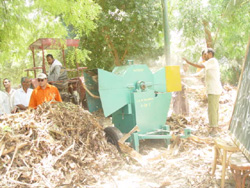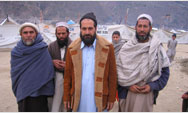You are here » Home » Telling Our Story
Success Story
Farmers clean canals and convert banana leaves into fertilizer
Farmers Transform Waste into Fertilizer

| |
Photo: USAID/Mina Luka
|
|
Farmers in El-Sheikh Eissa, in Egypt’s eastern El-Sharkia province, operate machines that chop up banana tree waste that will be used to fertilize their farms.
“In order to gain the confidence of the farmer, we have to make sure his first request is met, and then he will know that we are reliable and he can depend on us when he seeks help,” said Ahmed Hussein, an engineer working with the integrated water management district in Quena, Egypt.
|
Farmers and residents living along canals Egypt’s eastern El-Sharkia province have long used their open canal system almost as a sewer — people often threw their garbage into the canal and there were no organized efforts to keep the canals clean. This would pollute the water and clog up the water flow, depriving downstream farmers of water when they needed it for their crops.
USAID has been working with Egypt’s government to address environmental issues related to agricultural irrigation throughout Egypt. As part of the project, they helped farmers using those canals form canal water user associations. The government then formed integrated water management districts, which work with the associations to identify and resolve problems.
Sayed Abu-Bahgury, who heads one of the canal water user associations in El-Sheikh Eissa, remembers the day that he found out that the integrated water management district agreed to help his association buy and operate a mechanical chopper. This was the day that the canal’s future changed completely.
The chopper would serve two purposes: first, it would be used to chop up the discarded waste from banana trees that was often clogging up canals; second, it would make it possible to transform that waste into fertilizer to enrich the soil.
Today, canals are cleaner and flow better, allowing all farmers to use their waters for irrigation. The trash from the banana trees is no longer discarded in the canal, but instead transformed into fertilizer. Moreover, the fertilizer has brought a better harvest. Farmers today are able to get 50 tons of crops per acre, where previously the land produced only 40 tons per acre.
Other farmers have recognized these improvements and are realizing the importance of a canal water users association in meeting their needs. When they are ready to make improvements on their own canals, the integrated water management district in the nearby city of Quena will be ready to help.
Print-friendly version of this page (440kb - PDF)
Click here for high-res photo
Back to Top ^ | 

